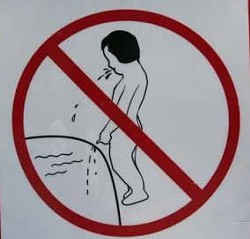That pool you were in Saturday? Full of cosmetics residue, sweat, bacteria and junk from your trunk.
The WQ&HC wants you to be aware that not showering before swimming is equivalent to recycling bath water. Which makes sense when you think about it. If it's 96 degrees outside, you're most likely sweaty and gummy; swamp butt may also be a factor. So that guy who just mowed his lawn, then walked directly to the pool and cannonballed into the deep end? He's a main ingredient in the filthy human gumbo that is a public pool.
"What about the chlorine?," you ask. "That chemical smell means the water's clean, right?" Wrong. That smell means the chlorine is reacting with a large amount of contaminants, creating chloramines; it is these chloramines that give off that distinctive swimming pool aroma. The more fragrant your pool, the more contaminated it is.
More chlorine can be added to right the imbalance, but the first line of defense -- and the best defense -- is a shower. The WQ&HC makes this abundantly clear with this statement (emphasis ours):
When swimmers shower away impurities (and focus on the perianal area) they help reduce the risk of waterborne illnesses, such as diarrhea, swimmer's ear and skin infections. Fecal matter, in particular, contains germs that may be ingested when swimmers swallow contaminated water. Chlorine and other swimming pool disinfectants help protect swimmers from waterborne germs, but germ destruction is not instantaneous.In other words: If your taint ain't scoured, better hit the showers.


